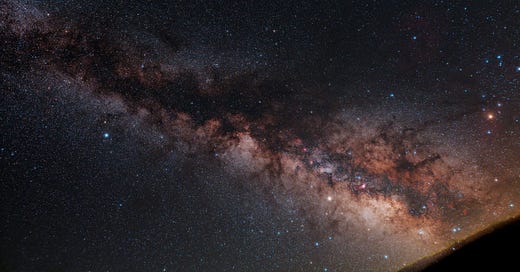In this new series, we will look at how I think the Hebrews viewed astronomy. I will unpack the connections between spiritual beings and the stars, the astronomical meanings behind some of the Old Testament Bible stories and talk about the Hebrew Zodiac.
Planets in the Bible
In the Bible we find some references to planets.
Venus
Isaiah 14 v 12
How you have fallen from heaven, morning star, son of the dawn! You have been cast down to the earth, you who once laid low the nations!
The phrase ‘Morning Star’ appears only once here in the Bible. It likely relates to Venus, which was known as the Morning Star in Babylonian astronomy.
Saturn
Amos 5 v 26
No, you served your pagan gods—Sakkuth your king god and Kaiwan your star god—the images you made for yourselves.
Kaiwan likely relates to the Babylonian name for the planet Saturn.
We also see the other planets possibly mentioned in the Bible:
Mercury - Isaiah 46 v 1
Mars - 2 Kings 17 v 30
Jupiter - Isaiah 65 v 11
Overall, there aren’t many explicit mentions of planets in the Scriptures, which I find surprising. Particularly as it appears astronomy/astrology was an important part of ancient pagan life.
Stars in the Bible
Job 38 v 31-32
“Can you bind the chains of the Pleiades? Can you loosen Orion’s belt? Can you lead forth the Mazzaroth in their season, or can you guide the Bear with its children?
Over the centuries there has been much discussion over the meaning of Mazzaroth. The current consensus is that it is the Zodiac, the group of constellations which sit in the elliptical plane.
The constellation Pleiades is mentioned twice in the Book of Job. Orion is also mentioned, along with the Great Bear (Ursa Major).
A word similar to Mazzaroth is mention in 2 Kings.
2 Kings 23 v 5
He did away with the idolatrous priests appointed by the kings of Judah to burn incense on the high places of the towns of Judah and on those around Jerusalem—those who burned incense to Baal, to the sun and moon, to the constellations (Mazzaroth) and to all the starry hosts.
Here Mazzaroth has been translated as constellations.
We can see there are only a few references to stars and planets in the Bible. And all of these are mentioned after the Hebrew period.
What is the Hebrew period in the Bible?
There are four periods in the Old Testament.
Pre-Hebrew
Hebrew
Israel
Judah
The first time the word Hebrew is used in the Old Testament is in Genesis.
Genesis 14:13
A man who had escaped came and reported this to Abram the Hebrew.
Here a man escapes the attack of the Five Kings and comes and tells Abraham that his nephew, Lot, had been captured by the invading army.
We know from archeology that this dates from between 1765 BC to 1722 BC.
Therefore, the Hebrew period in the Bible runs from about 1750 BC to the Exodus. This is where God frees the Hebrew slaves and the ‘mixed multitude’ from Egyptian rule and turns them into a new nation, Israel. This date is contested, but I believe the Exodus was 1225 BC.
So the Hebrew period stretches from 1750 BC to 1225 BC.
Astronomy in Mesopotamia
Before Abraham came to the Land of Canaan, he originally lived in Ur of the Chaldees. This is likely situated in Mesopotamia. At this time, Mesopotamians where recording astronomical data and were aware of the movements of the Heavenly Bodies.
It would be likely that Abraham would be aware of this too. So why wasn’t there any direct mentions of astronomy in the Hebrew Period? The stories of the earlier chapters of Genesis don’t have any mention of astronomy, apart from twice.
A single mention in Genesis 1:
Genesis 1 v 14-18
And God said, “Let there be lights in the vault of the sky to separate the day from the night, and let them serve as signs to mark sacred times, and days and years, and let them be lights in the vault of the sky to give light on the earth.” And it was so. God made two great lights—the greater light to govern the day and the lesser light to govern the night. He also made the stars. God set them in the vault of the sky to give light on the earth, to govern the day and the night, and to separate light from darkness. And God saw that it was good.
And a mention in the promise given to Abraham from God, about how his descendants would be like the stars:
Genesis 15 v 5
He took him outside and said, “Look up at the sky and count the stars—if indeed you can count them.” Then he said to him, “So shall your offspring be.”
Having said that, I think there are implicit mentions of the planets and stars in the Pre-Hebrew and Hebrew period, but it depends on the lens or the way we choose to interpret Scripture.
The next post in this series will look at some of the stories in Genesis which relate to the stars.




